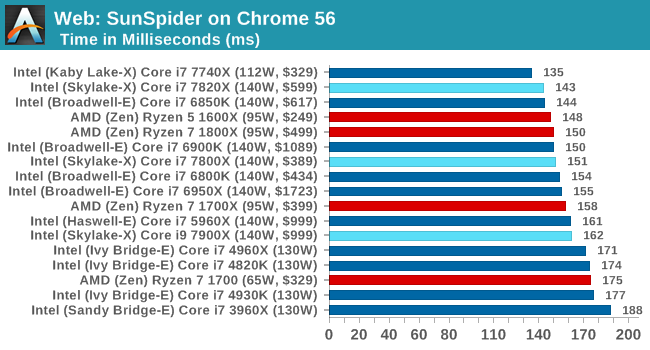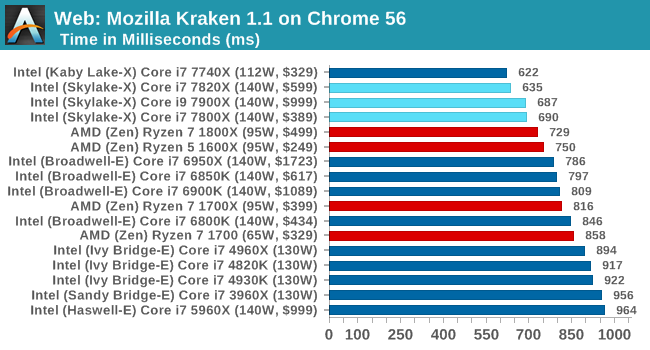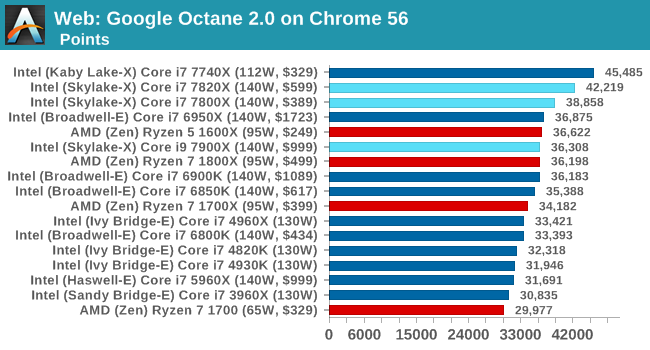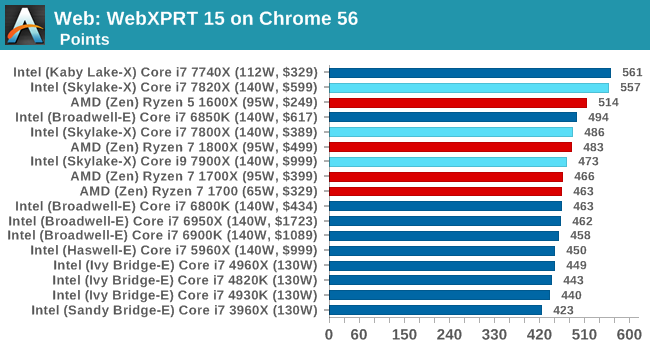The Intel Skylake-X Review: Core i9 7900X, i7 7820X and i7 7800X Tested
by Ian Cutress on June 19, 2017 9:01 AM ESTBenchmarking Performance: CPU Web Tests
One of the issues when running web-based tests is the nature of modern browsers to automatically install updates. This means any sustained period of benchmarking will invariably fall foul of the 'it's updated beyond the state of comparison' rule, especially when browsers will update if you give them half a second to think about it. Despite this, we were able to find a series of commands to create an un-updatable version of Chrome 56 for our 2017 test suite. While this means we might not be on the bleeding edge of the latest browser, it makes the scores between CPUs comparable.
SunSpider 1.0.2
The oldest web-based benchmark in this portion of our test is SunSpider. This is a very basic javascript algorithm tool, and ends up being more a measure of IPC and latency than anything else, with most high-performance CPUs scoring around about the same. The basic test is looped 10 times and the average taken. We run the basic test 4 times.

Sunspider goes after peak frequency most of the time, althoguh there is some variation as it moves into basically becoming a legacy test.
Mozilla Kraken 1.1
Kraken is another Javascript based benchmark, using the same test harness as SunSpider, but focusing on more stringent real-world use cases and libraries, such as audio processing and image filters. Again, the basic test is looped ten times, and we run the basic test four times.

Kraken is more of an intense attack on JS, and still regularly sorts by IPC and frequency.
Google Octane 2.0
Along with Mozilla, as Google is a major browser developer, having peak JS performance is typically a critical asset when comparing against the other OS developers. In the same way that SunSpider is a very early JS benchmark, and Kraken is a bit newer, Octane aims to be more relevant to real workloads, especially in power constrained devices such as smartphones and tablets.

Octane seems to be an optimization target, and with the new Skylake-X it shows.
WebXPRT 2015
While the previous three benchmarks do calculations in the background and represent a score, WebXPRT is designed to be a better interpretation of visual workloads that a professional user might have, such as browser based applications, graphing, image editing, sort/analysis, scientific analysis and financial tools.











264 Comments
View All Comments
Gastec - Sunday, August 20, 2017 - link
The Ryzen 1600X has the same theoretical frequencies as 1800X (on paper) minus 2 cores. Both Ryzen 1700X and 1700 have lower frequencies than 1600X. As to why the 1600X shows slightly better results than 1800X in some single-core tests it's probably due to a combination of lower power consumption(less heat) XFR and binning.Read this: http://www.anandtech.com/show/11244/the-amd-ryzen-...
dstephens80 - Monday, August 14, 2017 - link
All, I have come across something interesting and wondering if it is only me. I just received my 7820x and was playing around with overclocking and I have to question Intel's claim that the CPUs are "Fully Unlocked". Using an Asus Strix-E X299 MB I adjusted my overclock to 4.6Ghz and then booted successfully and started my stress testing. I noticed my clock speed was bouncing between 4.3 and 4.6 so I thought maybe speedstep was interfering and went into BIOS and turned off SpeedStep, TurboBoost and C-states. When I booted back up I received an error for the TurboBoost utility (expected) but my speed was at the stock 3.6Ghz and the Intel Extreme Utility showed the same but also showed my multiplier should be set at 46. I went back into BIOS and enabled "TurboBoost" and upon reboot CPUz/Intel utility both showed speed at 4.6Ghz. My issue with the "Fully Unlocked" claim is that an OC should not be dependent on a software driver. I have confimed this by the fact that when I boot Linux the OC is not applied.leeymcj - Sunday, September 3, 2017 - link
I have a question, so all the cores are equipped with dedicated AVX register? (cost ~15% of area for each of them)gogi95 - Wednesday, September 27, 2017 - link
what is replacement algorithm used in Intel core i9?